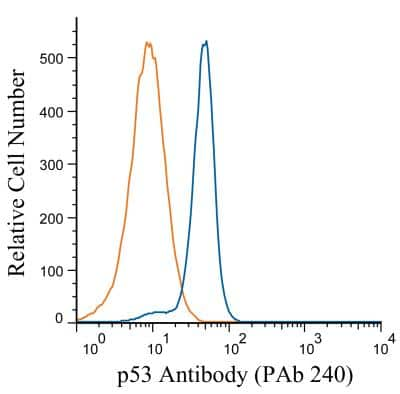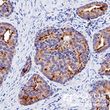p53 (TP53) Mouse Monoclonal Antibody [Clone ID: Pab 240]
Frequently bought together (3)
Transient overexpression lysate of tumor protein p53 (TP53), transcript variant 1
USD 396.00
Other products for "p53"
Specifications
| Product Data | |
| Clone Name | Pab 240 |
| Applications | WB |
| Recommended Dilution | Flow Cytometry: 1:10-1:1000, ELISA: 1:100-1:2000, Immunohistochemistry: 1:250-1:500, Immunoprecipitation: 10ug/mg, Western Blot: 1:1000-1:2000, Immunohistochemistry-Paraffin: 1:250-1:500, Flow (Intracellular), Immunocytochemistry/ Immunofluorescence: 5 ug/ml, Immunohistochemistry-Frozen, CyTOF-ready |
| Reactivities | Human, Mouse, Rat, Yeast (Does not react with: Xenopus) |
| Host | Mouse |
| Isotype | IgG1, kappa |
| Clonality | Monoclonal |
| Immunogen | Gel-purified p53-beta-galactosidase fusion protein containing murine p53 from aa 14-389 (derived from pSV53C cDNA clone). |
| Formulation | PBS containing 0.05% BSA, 0.05% Sodium Azide. Store at 4C short term. Aliquot and store at -20C long term. Avoid freeze-thaw cycles. |
| Concentration | lot specific |
| Purification | Protein G purified |
| Conjugation | Unconjugated |
| Storage | Store at -20°C as received. |
| Stability | Stable for 12 months from date of receipt. |
| Gene Name | tumor protein p53 |
| Database Link | |
| Background | The tumor suppressor protein p53 plays an important role in cancer development. The p53 protein is a transcription factor that acts as a checkpoint in the cell cycle, either preventing or initiating programmed cell death. Since cancer occurs as the malfunction in the proliferation of cells, disrupting p53 activity allows abnormal cells to multiply or allows a tumor's progression from benign to malignant. This antibody detects p53 in all mammals tested. Detection of p53 using this antibody: 50% of colon cancer sections are positive, 30% of breast cancer sections and 70% of lung cancer sections. Normal and premalignant tissues are negative. |
| Synonyms | BCC7; LFS1; P53; TRP53 |
| Note | Antigen retrieval with IHC-P is not essential but may optimise staining. In IP this antibody reacts with only mutant p53 protein under non-denaturing conditions. Use in Immunocytochemistry/immunofluorescence reported in scientific literature (PMID 1394225) Use in Immunohistochemistry-Frozen reported in various pieces of scientific literature. |
| Reference Data | |
| Protein Families | Druggable Genome, Stem cell - Pluripotency, Transcription Factors |
| Protein Pathways | Amyotrophic lateral sclerosis (ALS), Apoptosis, Basal cell carcinoma, Bladder cancer, Cell cycle, Chronic myeloid leukemia, Colorectal cancer, Endometrial cancer, Glioma, Huntington's disease, MAPK signaling pathway, Melanoma, Neurotrophin signaling pathway, Non-small cell lung cancer, p53 signaling pathway, Pancreatic cancer, Pathways in cancer, Prostate cancer, Small cell lung cancer, Thyroid cancer, Wnt signaling pathway |
Documents
| Product Manuals |
| FAQs |
| SDS |
{0} Product Review(s)
0 Product Review(s)
Submit review
Be the first one to submit a review
Product Citations
*Delivery time may vary from web posted schedule. Occasional delays may occur due to unforeseen
complexities in the preparation of your product. International customers may expect an additional 1-2 weeks
in shipping.






























































































































































































































































 Germany
Germany
 Japan
Japan
 United Kingdom
United Kingdom
 China
China

![Flow Cytometry: p53 Antibody (PAb 240) TA336582 - An intracellular stain was performed on HeLa cells with p53 Antibody [PAb 240] TA336582 (blue) and a matched isotype control (orange). Cells were fixed with 4% PFA and then permeabilized with 0.1% saponin. Cells were incubated in an antibody dilution of 1.0 ug/mL for 30 minutes at room temperature, followed by Mouse IgG (H+L) Cross-Adsorbed Secondary Antibody, Dylight 550 (35503, Thermo Fisher).](https://cdn.origene.com/assets/images/antibody/primary-antibody/108/ta336582-10-c.jpg?d=110x110)


![Flow Cytometry: p53 Antibody (PAb 240) TA336582 - An intracellular stain was performed on Neuro2a cells with p53 Antibody [PAb 240] TA336582 (blue) and a matched isotype control (orange). Cells were fixed with 4% PFA and then permeabilized with 0.1% saponin. Cells were incubated in an antibody dilution of 1.0 ug/mL for 30 minutes at room temperature, followed by Mouse IgG (H+L) Cross-Adsorbed Secondary Antibody, Dylight 550 (35503, Thermo Fisher).](https://cdn.origene.com/assets/images/antibody/primary-antibody/108/ta336582-9-c.jpg?d=110x110)





![Flow Cytometry: p53 Antibody (PAb 240) TA336582 - An intracellular stain was performed on MCF7 cells with p53 [PAb 240] Antibody TA336582AF647 (blue) and a matched isotype control (orange). Cells were fixed with 4% PFA and then permeabilized with 0.1% saponin. Cells were incubated in an antibody dilution of 2.5 ug/mL for 30 minutes at room temperature. Both antibodies were conjugated to Alexa Fluor 647.](https://cdn.origene.com/assets/images/antibody/primary-antibody/108/ta336582-8-c.jpg?d=110x110)


